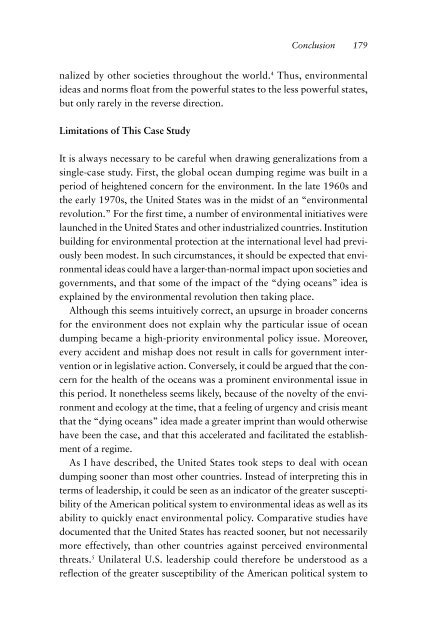Radioactive Waste Disposal at Sea: Public Ideas ... - IMO
Radioactive Waste Disposal at Sea: Public Ideas ... - IMO
Radioactive Waste Disposal at Sea: Public Ideas ... - IMO
Create successful ePaper yourself
Turn your PDF publications into a flip-book with our unique Google optimized e-Paper software.
Conclusion 179<br />
nalized by other societies throughout the world. 4 Thus, environmental<br />
ideas and norms flo<strong>at</strong> from the powerful st<strong>at</strong>es to the less powerful st<strong>at</strong>es,<br />
but only rarely in the reverse direction.<br />
Limit<strong>at</strong>ions of This Case Study<br />
It is always necessary to be careful when drawing generaliz<strong>at</strong>ions from a<br />
single-case study. First, the global ocean dumping regime was built in a<br />
period of heightened concern for the environment. In the l<strong>at</strong>e 1960s and<br />
the early 1970s, the United St<strong>at</strong>es was in the midst of an “environmental<br />
revolution.” For the first time, a number of environmental initi<strong>at</strong>ives were<br />
launched in the United St<strong>at</strong>es and other industrialized countries. Institution<br />
building for environmental protection <strong>at</strong> the intern<strong>at</strong>ional level had previously<br />
been modest. In such circumstances, it should be expected th<strong>at</strong> environmental<br />
ideas could have a larger-than-normal impact upon societies and<br />
governments, and th<strong>at</strong> some of the impact of the “dying oceans” idea is<br />
explained by the environmental revolution then taking place.<br />
Although this seems intuitively correct, an upsurge in broader concerns<br />
for the environment does not explain why the particular issue of ocean<br />
dumping became a high-priority environmental policy issue. Moreover,<br />
every accident and mishap does not result in calls for government intervention<br />
or in legisl<strong>at</strong>ive action. Conversely, it could be argued th<strong>at</strong> the concern<br />
for the health of the oceans was a prominent environmental issue in<br />
this period. It nonetheless seems likely, because of the novelty of the environment<br />
and ecology <strong>at</strong> the time, th<strong>at</strong> a feeling of urgency and crisis meant<br />
th<strong>at</strong> the “dying oceans” idea made a gre<strong>at</strong>er imprint than would otherwise<br />
have been the case, and th<strong>at</strong> this acceler<strong>at</strong>ed and facilit<strong>at</strong>ed the establishment<br />
of a regime.<br />
As I have described, the United St<strong>at</strong>es took steps to deal with ocean<br />
dumping sooner than most other countries. Instead of interpreting this in<br />
terms of leadership, it could be seen as an indic<strong>at</strong>or of the gre<strong>at</strong>er susceptibility<br />
of the American political system to environmental ideas as well as its<br />
ability to quickly enact environmental policy. Compar<strong>at</strong>ive studies have<br />
documented th<strong>at</strong> the United St<strong>at</strong>es has reacted sooner, but not necessarily<br />
more effectively, than other countries against perceived environmental<br />
thre<strong>at</strong>s. 5 Unil<strong>at</strong>eral U.S. leadership could therefore be understood as a<br />
reflection of the gre<strong>at</strong>er susceptibility of the American political system to

















